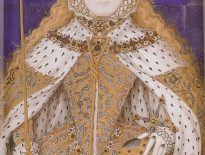On this day in Tudor history, 18th November 1559, Ralph Baynes (Baines), Bishop of Coventry and Lichfield, died.
Baynes had been actively involved in the persecutions of Protestants in Mary I's reign, examining many well-known martyrs and featuring in John Foxe's "Book of Martyrs", but ended his days imprisoned in the home of Edmund Grindal, Bishop of London - why?
Find out more about Ralph Baynes, his life and career, and how he came to be deprived of his bishopric and die the way he did, in today's talk.
Also on this exact day in Tudor history, 18th November 1559, another former bishop died in custody: eighty-five-year-old Cuthbert Tunstall, Bishop of Durham, who was in the custody of Matthew Parker, Archbishop of Canterbury, at Lambeth Palace.
Cuthbert Tunstall had an amazing career which spanned the reigns of Henry VIII, Edward VI and Mary I, and he was imprisoned in two of those monarchs' reigns. In last year’s video, I gave an overview of Tunstall’s interesting life and career:
Also on this day in history:
- 1531 – Birth of Roberto di Ridolfi, merchant, banker and conspirator, in Florence, Italy. In the 1570s, Ridolfi, who was a papal agent, acted as a go-between for the Spanish and the Duke of Norfolk, and was the man responsible for funding the rebellion which aimed to have a Northern Catholic rebellion and an invasion by Spanish forces under Philip of Spain. The plot became known as the Ridolfi Plot, and was uncovered before it was put into action.
- 1600 – Death of William Hughes, Bishop of St Asaph and former chaplain to Thomas Howard, 4th Duke of Norfolk, at Diserth. He was buried in the cathedral choir. Hughes acted as patron to the Welsh poets William Cynwal, William Llŷn, and Siôn Tudur.
Transcript:
On this day in Tudor history, 18th November 1559, Bishop of Coventry and Lichfield, Ralph Baynes (Baines), died. He was buried in the church of St Dunstan-in-the-West, London.
At the time of his death, Baynes was imprisoned in the London home of Edmund Grindal, Bishop of London. He’d been deprived of his bishopric and put into Grindal’s care in June 1559, but why?
Let me tell you a bit more about this Tudor bishop and how he came to this rather sad end…
• Nothing is known of Baynes’ family and his birthdate is also unknown, but he was a Yorkshireman, probably from Knowsthorpe, and he studied at St John’s College, Cambridge, attaining a BA in 1518 and an MA in 1521. He also became a fellow at the college in 1521.
• In 1519, he was ordained as a priest at Ely in Cambridgeshire and he became rector of Hardwick in the same county at some point, holding the post until he resigned in 1545. In 1527 he was a university preacher.
• In 1532 he attained his Bachelor of Theology, and twenty-three years later, in 1555, attained his doctorate.
• In Henry VIII’s reign, he opposed the annulment of Henry VIII’s marriage to Catherine of Aragon, and spoke out against the preaching of Hugh Latimer, who was of the reformed faith, and it appears that he went abroad during Edward VI’s reign, working as a professor of Hebrew in Paris. While in Paris, Baynes wrote a Hebrew grammar published in 1550, the first Hebrew grammar book published by an Englishman. He also produced two other books on Hebrew.
• Baynes returned to England when the Catholic Mary I came to the throne and in November 1554 he was consecrated Bishop of Coventry and Lichfield.
• During Mary’s reign, with his chancellor, Anthony Draycot, he carried out many examinations of Protestants, including John Hooper, Robert Glover, John Philpot, and Joan Waste, Waste being a young blind woman who was burnt at the stake in Derby in 1556 for refusing to recant her Protestant faith. Baynes is mentioned on numerous occasions in this role in martyrologist John Foxe’s Book of Martyrs.
• As a staunch Catholic, when Elizabeth I came to the throne in November 1558, he opposed her new religious measures and was one of the five bishops who defended Catholicism at the 1559 Westminster Conference.
• In June 1559, Baynes was deprived of his bishopric and imprisoned in the home of Protestant Edmund Grindal, Bishop of London. Thomas Betham replaced him as bishop.
Baynes was one of eleven bishops imprisoned in this way in Elizabeth I’s reign, and their bishoprics given to Protestants. These imprisoned bishops included Edmund Bonner, Bishop of London; Richard Pate, Bishop of Worcester; Gilbert Scott, Bishop of Chester; Cuthbert Tunstall, Bishop of Durham; Thomas Watson, Bishop of Lincoln, and Nicholas Heath, Archbishop of York, who was temporarily imprisoned.
• On this day in history, 18th November 1559, he died at Grindal’s house, according to contemporary John Strype of “the stone”. I assume that’s referring to kidney stones, I don’t know.
• Baynes was laid to rest at St Dunstan-in-the-West in London on 24th November.



Leave a Reply